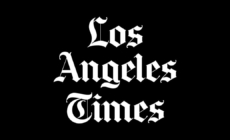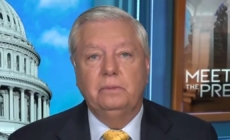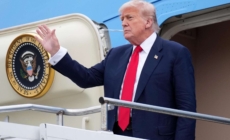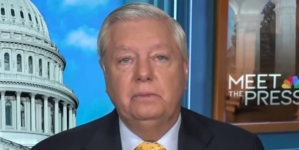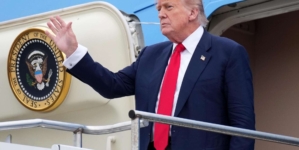-
A New ‘Golden Generation’? FOX Sports Crew Discuss Spain’s Recent Dominance - 17 mins ago
-
Can a county fire a sheriff behind closed doors? Advocacy group threatens to sue for access - 19 mins ago
-
Woman Due to Give Birth on Sister’s Wedding Day, Shock at What Happens - 32 mins ago
-
Sen. Lindsey Graham says there’s no way to for Israel to negotiate an end to the war with Hamas - 41 mins ago
-
UEFA Women’s Euro 2025 Final: Spain-England In Blockbuster Title - about 1 hour ago
-
How to Watch Indiana Fever vs Chicago Sky: Live Stream WNBA, TV Channel - about 1 hour ago
-
WR Terry McLaurin Joins Commanders Camp Amid Contract Dispute - 2 hours ago
-
Donald Trump’s Favorability Rating Falls With AAPI Adults - 2 hours ago
-
Bet365 Bonus Code WEEK365: Claim $150 Bonus For 15 Sunday MLB Games - 2 hours ago
-
How to stop spam mail, political texts and unwanted emails for good - 3 hours ago
Are US-Iran Nuclear Talks at a Dead-End? | Opinion
How close is the United States and Iran to striking a new nuclear deal? According to President Donald Trump, the two nations are nearing the final stretch. During his four-day trip to the Middle East last week, Trump made it seem like an agreement was already being initialed. “Iran has sort of agreed to the terms,” he said in Qatar. “They’re not going to make, I call it, in a friendly way, nuclear dust. We’re not going to be making any nuclear dust in Iran.”
As he often does, Trump was embellishing reality. The negotiations between Washington and Tehran only started on April 12, so to think the two are near the end-game of finalizing a highly-technical nuclear accord is very difficult to imagine. It took the Obama administration and Iran about three years to negotiate the Joint Comprehensive Plan of Action (JCPOA), a process that had its fair share of stumbling points along the way. From the looks of it, the Trump administration’s own talks with the Iranians have only touched the surface; the first four rounds didn’t get into the nitty-gritty details, which is likely one reason why U.S. and Iranian officials were relatively upbeat.
Anna Moneymaker/Getty Images
Trump is a man in a hurry. He doesn’t want Tehran to string the talks along and has stated numerous times that the Iranians have two options: they can either get of their nuclear program the easy way or the hard way. And the hard way, military force, would be terrible for them. “They know they have to move quickly or something bad is gonna happen,” Trump said.
While it might be a cliche to say the devil of any nuclear deal is in the details, it also happens to be accurate. The details will make or break the entire diplomatic process. Right now, Washington and Tehran are stuck on the most critical detail of them all: whether the Iranians will be able to operate a uranium enrichment program. Steve Witkoff, Trump’s envoy leading the U.S. delegation, has become increasingly hawkish in his rhetoric about what is and isn’t acceptable for the Trump administration in any prospective agreement. During a recent interview, Witkoff stressed that “we have one very, very clear red line, and that is enrichment. We cannot allow even 1 percent of an enrichment capability.” These comments are in league with Secretary of State Marco Rubio, who argued that Iran is free to have a peaceful nuclear energy program as long as it imports the fuel needed to power the reactors.
The Iranian government reacted with defiance. After suggesting that Witkoff’s public remarks didn’t match his actual position in the talks, Iranian Foreign Minister Seyed Abbas Araghchi reiterated Iran’s right to enrich for peaceful purposes. Supreme Leader Ayatollah Ali Khamenei, who makes all the major decisions with respect to Iran’s foreign and security policy, didn’t appreciate the public show of pressure from the Americans and was characteristically undiplomatic in his response, telling U.S. officials to “avoid making nonsense remarks” and questioning whether the negotiations with Washington will lead anywhere.
For those on the outside, it’s impossible to know whether this rhetorical spat is just the usual gamesmanship that goes on during high-stakes negotiations or an illustration of their actual positions. One can only hope it’s the first scenario, because the second leaves no hope for successful diplomacy.
Trump feels pressure to attain an agreement with Iran that is stronger than what Obama negotiated a decade ago. Obama’s JCPOA capped Iran’s stockpile of enriched uranium to ensure a so-called nuclear breakout was prevented, reduced the number and type of centrifuges Iranian scientists could use, and permitted inspectors to monitor all aspects of Tehran’s nuclear work. Trump and many of his fellow Republicans, however, were adamant that Obama could have gotten more from the Iranians but failed to press harder. The sunset provisions were a particular annoyance to proponents of a tougher line—some activities related to centrifuges expired after 10 years, whereas limits on Iran’s enrichment stockpile were lifted after 15 years.
By holding fast to a policy of no enrichment, Trump is far more likely to tank the nuclear talks than attain the better deal he’s aspiring to secure. The enrichment train left the station a long time ago. The Iranians have been enriching since 2006, and spent years building a nuclear apparatus at great cost to itself in the form of Western sanctions and diplomatic isolation. The entire nuclear program is now a point of pride for the Islamic Republic, so to expect the Iranians to trade it away, even if the benefits include a re-opening of the Iranian economy, is likely an exercise in wishful thinking. The first experience with Trump, during which he withdrew the United States from the JCPOA and re-imposed secondary sanctions on Tehran, hasn’t helped convince the Iranian political elite that Washington will stick to whatever terms it signed onto years earlier.
The United States can live with an Iranian enrichment program that is curtailed and continuously monitored. Trump would be unwise to let the perfect be the enemy of the good.
Daniel R. DePetris is a fellow at Defense Priorities and a syndicated foreign affairs columnist at the Chicago Tribune.
The views expressed in this article are the writer’s own.
Source link

